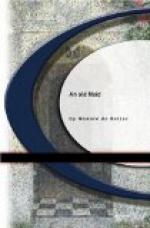It was not without some private intention that the Chevalier de Valois had turned Suzanne’s designs upon Monsieur du Bousquier. The liberal and the royalist had mutually divined each other in spite of the wide dissimulation with which they hid their common hope from the rest of the town. The two old bachelors were secretly rivals. Each had formed a plan to marry the Demoiselle Cormon, whom Monsieur de Valois had mentioned to Suzanne. Both, ensconced in their idea and wearing the armor of apparent indifference, awaited the moment when some lucky chance might deliver the old maid over to them. Thus, if the two old bachelors had not been kept asunder by the two political systems of which they each offered a living expression, their private rivalry would still have made them enemies. Epochs put their mark on men. These two individuals proved the truth of that axiom by the opposing historic tints that were visible in their faces, in their conversation, in their ideas, and in their clothes. One, abrupt, energetic, with loud, brusque manners, curt, rude speech, dark in tone, in hair, in look, terrible apparently, in reality as impotent as an insurrection, represented the republic admirably. The other, gentle and polished, elegant and nice, attaining his ends by the slow and infallible means of diplomacy, faithful to good taste, was the express image of the old courtier regime.
The two enemies met nearly every evening on the same ground. The war was courteous and benign on the side of the chevalier; but du Bousquier showed less ceremony on his, though still preserving the outward appearances demanded by society, for he did not wish to be driven from the place. They themselves fully understood each other; but in spite of the shrewd observation which provincials bestow on the petty interests of their own little centre, no one in the town suspected the rivalry of these two men. Monsieur le Chevalier de Valois occupied a vantage-ground: he had never asked for the hand of Mademoiselle Cormon; whereas du Bousquier, who entered the lists soon after his rejection by the most distinguished family in the place, had been refused. But the chevalier believed that his rival had still such strong chances of success that he dealt him this coup de Jarnac with a blade (namely, Suzanne) that was finely tempered for the purpose. The chevalier had cast his plummet-line into the waters of du Bousquier; and, as we shall see by the sequel, he was not mistaken in any of his conjectures.
Suzanne tripped with a light foot from the rue du Cours, by the rue de la Porte de Seez and the rue du Bercail, to the rue du Cygne, where, about five years earlier, du Bousquier had bought a little house built of gray Jura stone, which is something between Breton slate and Norman granite. There he established himself more comfortably than any householder in town; for he had managed to preserve certain furniture and decorations from the days of his splendor. But




